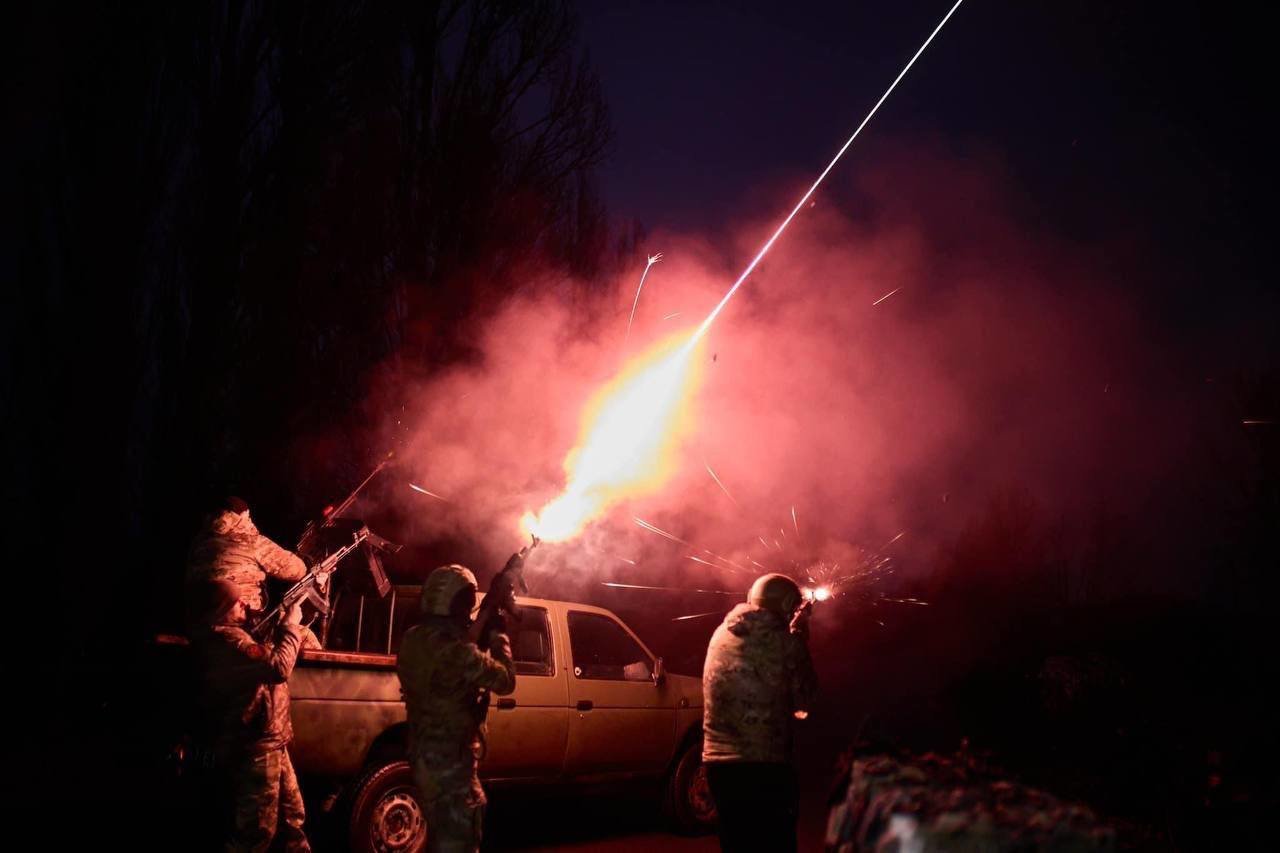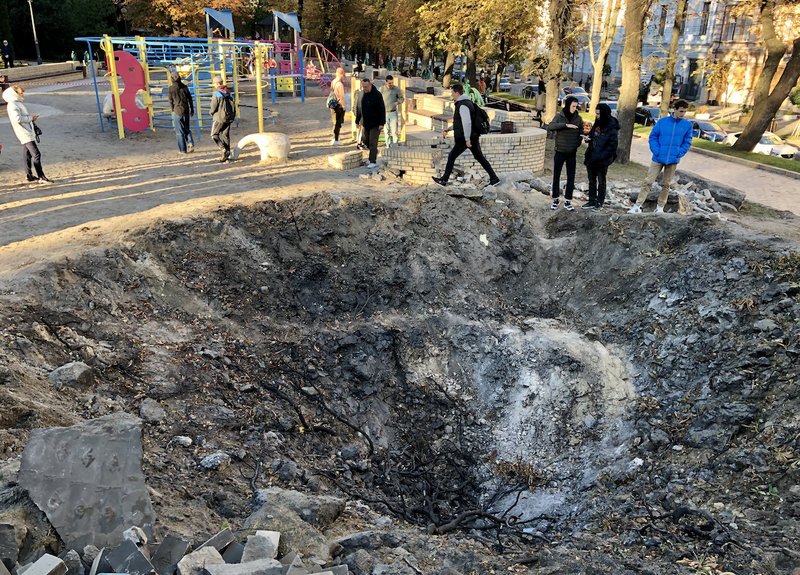The Balloon Saga Continues: This Time Russia Sends Them Over Kyiv

A mobile air defense unit from Kyiv‘s Territorial Defense Force on the lookout for Russian drone strikes in an undated photo. Photo courtesy Kyiv Territorial Defense Force via Twitter.
Ukraine’s military reported that its air defenses spotted six Russian balloons over Kyiv on Wednesday, Feb. 15, and shot most of them down.
According to a Kyiv City Administration statement, the balloons, which triggered the city’s air raid alert sirens, likely carried reconnaissance equipment and were part of a broader Russian effort to wear down Ukraine’s air defense units and expose their locations.
“Air defense equipment worked on all air targets. Most of these probes were shot down,” the city administration reported Wednesday on Telegram. “The purpose of launching the balloons was possibly to detect and exhaust our anti-aircraft defense.”
Referring to the balloons, Ukrainian air force spokesman Yuriy Ihnat said that Russia “uses such flying objects for reconnaissance or to confuse air defense systems.”
“These objects could carry radar reflectors and certain reconnaissance equipment,” Ihnat said during a televised briefing Wednesday, adding that Ukrainian forces downed at least two of the balloons with bullets, rather than using costly surface-to air missiles.
Images of the downed balloons posted to social media suggest they had no means of propulsion other than wind drift. The presence of radar reflectors suggests that one of the balloons’ potential functions was to overload and confuse Ukrainian air defense radars ahead of a mass missile attack.
“The radar does not show what kind of target it is…they must be shot down, because it is not known whether there is a combat component there or not,” Ihnat said Wednesday.
In October, Russia stepped up a strategic campaign of missile and drone strikes against critical infrastructure sites across Ukraine. Since then, Russian forces have often preceded mass cruise missile strikes with waves of cheaper, Iranian-made exploding drones acting as pathfinders.
Wednesday’s balloon flights over Kyiv suggest that Moscow may have a new, if quite primitive, tool to pave the way for mass missile attacks, as well as to steadily erode Ukraine’s air defense missile reserves.
Social media photos show that Wednesday’s balloons were crude, probably improvised contraptions cobbled together like a science fair project — a far cry from the advanced, high-altitude Chinese spy balloon that traversed the contiguous United States earlier this month.
Even so, the deployment of thousands of balloons could present Ukraine with a serious air defense challenge.

The crater left by a Russian missile after an attack on Kyiv on Oct. 10, 2022. Photo by Nolan Peterson/Coffee or Die.
Moscow, for its part, has already expended most of its cruise missile stocks, effectively limiting the pace of Russian strategic strikes to the rate by which Russian industry can produce new missiles. Western sanctions over the invasion of Ukraine have also hampered Russia’s ability to mass-produce cruise missiles — particularly when it comes to microchips and other advanced components needed for precision targeting.
Moscow has tried to upgrade its Kh-101 cruise missiles, the workhorse of Russia’s strategic strike campaign against Ukraine, with radar countermeasures. That gambit has so far failed, and Ukrainian air defense units maintain a high success rate in downing Kh-101 missiles.
“Studies and statistics on the operation of Ukrainian air defense systems have shown that the latest upgrade of the Kh-101 cruise missile did not meet the expectations of the aggressor country,” Ukrainian Col. Nikolai Danilyuk, a representative of the Ukrainian armed forces general staff, said during a Thursday briefing, multiple Ukrainian agencies reported.
“A massive breakthrough of the air defense system is not carried out, and Russian missiles are increasingly falling on the territory of the Russian Federation, not reaching Ukraine,” Danilyuk said.
On Wednesday night, hours after the balloons were downed over Kyiv, Russia launched a wave of 36 air- and sea-launched cruise missiles at targets across Ukraine, including the capital city’s region. The Ukrainian military reported that its air defenses downed 16 of those missiles.
“Unfortunately, some of the Kh-22 winged missiles achieved their goals by striking critical infrastructure objects,” Ukraine’s general staff reported.
The supersonic Kh-22 “carrier killer” cruise missile has a range of about 370 miles and carries a 2,000-pound warhead. The Ukrainian air force announced on Jan. 17 that it currently has no air defense systems capable of downing Russia’s Kh-22 missiles.
A spate of balloon intrusions spiked military tensions worldwide this month.
On Tuesday, Romania — a NATO member that shares a land border with Ukraine — scrambled fighter jets to intercept an unidentified object resembling a weather balloon in its airspace.
Earlier this month, a Chinese spy balloon drifted across the continental US before a US Air Force F-22 fighter shot it down off the South Carolina coast.
Read Next: Ukraine Wants To Store Europe’s Strategic Gas Reserves

BRCC and Bad Moon Print Press team up for an exclusive, limited-edition T-shirt design!
BRCC partners with Team Room Design for an exclusive T-shirt release!
Thirty Seconds Out has partnered with BRCC for an exclusive shirt design invoking the God of Winter.
Lucas O'Hara of Grizzly Forge has teamed up with BRCC for a badass, exclusive Shirt Club T-shirt design featuring his most popular knife and tiomahawk.
Coffee or Die sits down with one of the graphic designers behind Black Rifle Coffee's signature look and vibe.
Biden will award the Medal of Honor to a Vietnam War Army helicopter pilot who risked his life to save a reconnaissance team from almost certain death.
Ever wonder how much Jack Mandaville would f*ck sh*t up if he went back in time? The American Revolution didn't even see him coming.
A nearly 200-year-old West Point time capsule that at first appeared to yield little more than dust contains hidden treasure, the US Military Academy said.












